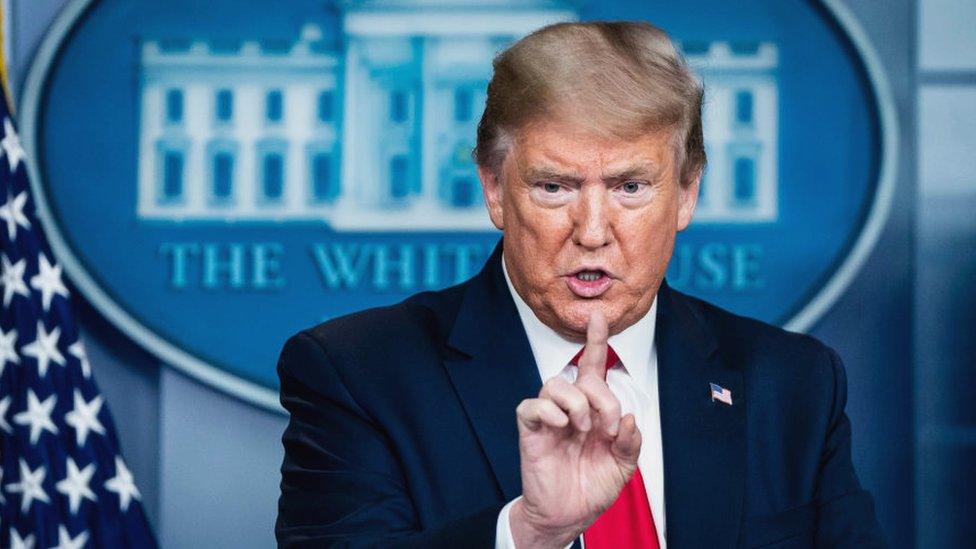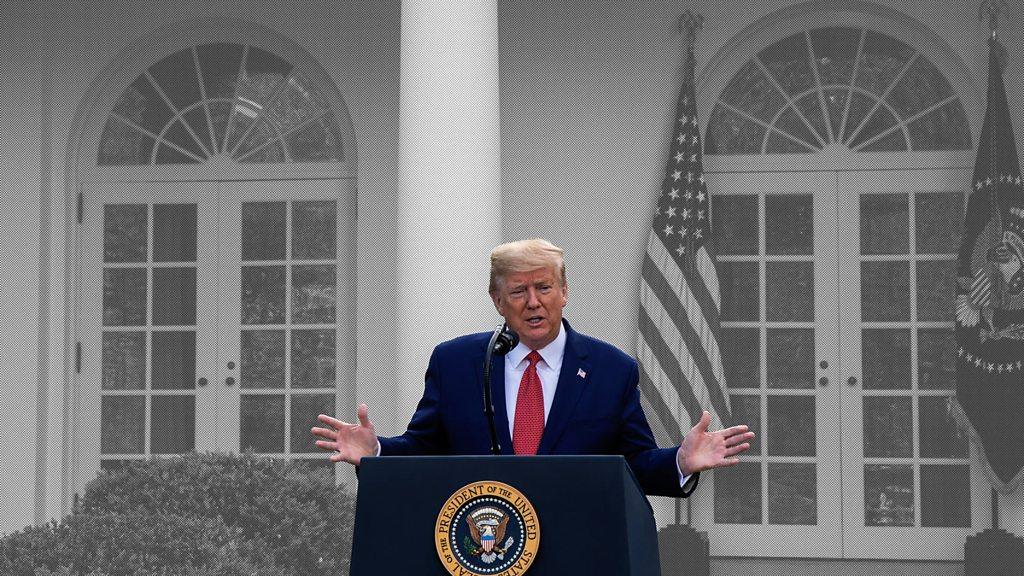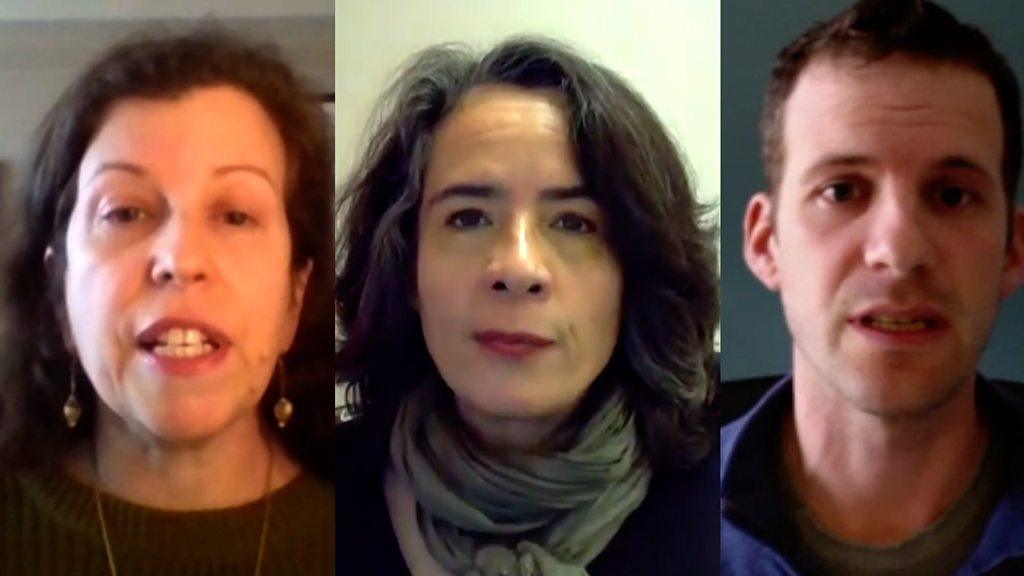Why are Trump and Obama in a new spat over Flynn?
- Published
How Michael Flynn became entangled in Russia probe
The Justice Department's surprising decision to drop all charges against Donald Trump's former national security adviser has set off a cascade of accusations and counter-accusations. And at the centre of it are the present and previous presidents.
Michael Flynn was forced to resign early in the Trump presidency for lying to Vice-President Mike Pence about his contacts with Russian government officials.
He had also pleaded guilty to lying to FBI agents investigating ties between Russia and the Trump campaign.
After years of legal wrangling, however, the former three-star general is now a free man.
What are Trump and Obama saying?
Obama has largely held his tongue about the actions of his successor but on Friday in a call to 3,000 former aides and officials that was leaked to the media, he let loose.
"There is no precedent that anybody can find for someone who has been charged with perjury just getting off scot-free," he said. "That's the kind of stuff where you begin to get worried that basic - not just institutional norms - but our basic understanding of rule of law is at risk."
Trump, who has never been shy about criticising - or blaming - his predecessor, responded with a flurry of social media posts and retweets on Sunday, accusing Obama and his aides of engaging in a criminal effort to undermine his presidency.
‘We voted for Obama, then Trump’
He amplified the assertions of right-wing commentators and lashed out at Obama, former Deputy FBI Director Andrew McCabe, former Deputy Attorney General Rod Rosenstein, late-night television host Jimmy Kimmel and numerous reporters and media outlets.
"The biggest political crime in American history, by far!" the president wrote, retweeting a conservative talk-radio host who accused Obama officials of sabotaging Trump in the days before he took office.
Why did it take off?
The president frequently used the term "Obamagate" - a reference to the Nixon-era Watergate scandal - in connection with his allegations, and prominent conservative activists and Trump-affiliated support groups quickly picked up the hashtag.
Although the term predates Trump's usage, on Sunday it received more than two million tweets - further evidence of the power of the president's social media platform.
The hashtag had been in use in obscure and fringe right-wing circles for a while, particularly amongst a minority of MAGA and QAnon users, but it never went beyond those small circles.
The new spike in its traffic began early Sunday in the US, and about 86% of that was in the form of retweets, suggesting there was some degree of coordination. But there was no evidence of botnets being involved.
Why were the charges dropped?
The decision to drop the charges of making a false statement to the FBI were made by a US government lawyer who Attorney General Bill Barr appointed to review the prosecution.
Because the FBI investigation into Flynn and his contacts with Russian officials had no basis "at that stage", Barr said, Flynn should not have been charged for lying about it.
Flynn had been included in the FBI's counter-intelligence inquiry that ran through much of 2016, but he became a focus of the agency's efforts after he publicly denied he had discussed US sanctions on Russia with Russian Ambassador Sergey Kislyak after Trump's election.
The FBI had surveillance recordings of Flynn's conversation that proved the contrary. Flynn was not yet part of the new administration when he was discussing the softening of sanctions.
The move to drop the charges has provoked a firestorm of criticism, including from Democrats in Congress.
"The current leadership of the department has taken extraordinary steps to protect the president's allies and punish his enemies, real and imagined," they wrote. "In our view, these cases represent a systematic breakdown of impartial justice at the Department of Justice and suggest overt political bias, if not outright corruption."
Do Trump's accusations against Obama have any merit?
The president has long viewed the entirety of the investigation into Russian efforts to meddle in the 2016 US election as an attempt to undermine the legitimacy of his presidency.
As evidence emerged that some of the FBI Russia-probe team privately expressed criticism of Trump as a presidential candidate, he has felt validated.
These views have been further compounded as former FBI Director James Comey, former Director of National Intelligence James Clapper and now Obama himself have all roundly criticised Trump, his policies and his presidency.
Nazis, demagogues and conspiracy theories - three Obama attacks on Trump
In the latter months of 2016, the US government was receiving increasingly dire warnings from its intelligence agencies of Russian efforts to disrupt the 2016 presidential election - efforts that the Robert Mueller special counsel investigation further detailed.
He also unearthed evidence of contact between members of the Trump campaign and Russian nationals. The FBI counter-intelligence investigation was initiated to probe these contacts and activities.
Obama-era officials in the intelligence community, the FBI and the White House continue to view the actions they took based on this evidence as fully justified.
Trump and his supporters only see their assertions and indignity as further evidence of wrongdoing and cover-up.
"I wouldn't be surprised if you see a lot of things happen over the next number of weeks," Trump said in the Oval Office on Thursday after learning of the Flynn news.
The acrimony in the fight over Flynn could be just getting started.
Additional reporting by Shayan Sardarizadeh of BBC Monitoring's Disinformation Team
- Published24 April 2020

- Published3 April 2020

- Published25 April 2020

- Published24 April 2020

- Published1 April 2020
